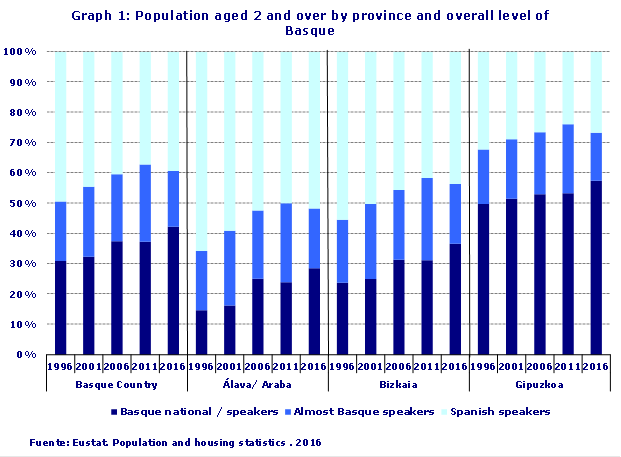Press release 20/03/2018
Three out of five people living in the Basque Country had some knowledge of the Basque language in 2016
The number of Basque speakers grew by 106,503 between 2011 and 2016
60.7% of the population of the Basque Country aged 2 years and over, 1,287,839 people, had some knowledge of Basque in 2016, according to Eustat data. According to level of knowledge, 895,942 were Basque speakers, that is, people who understand and speak Basque well, and 391,897 were Quasi-Basque speakers, with an average or good level of understanding but with difficulty speaking.
In addition, in the last five-year period studied, the growth of the number of Basque speakers, which rose from 37.2% of the total in 2011 to 42.2% in 2016, particularly stands out. This was to the detriment of the Quasi-Basque speaker category, which decreased 7.1 percentage points with respect to 2011. In this regard, the evolution of the percentage of Basque speakers over the last two decades is significant, growing 11.3 percentage points between 1996 and 2016

At provincial level, in 2016 Gipuzkoa continued to be the province with the highest percentage of Basque-speaking population with 57.4%, representing an increase of 4.1 percentage points with respect to 2011. It was followed by Bizkaia, with 36.6% Basque speakers and an increase of 5.4 percentage points, and Álava, with 28.5% and a growth of 4.6 points. Moreover, if Quasi-Basque speakers are included, three out of four people in Gipuzkoa had knowledge of Basque, three out of five in Bizkaia and one out of two in Álava.
At a more detailed geographic level, the regions with the largest presence of Basque speakers were, in order: Gran Bilbao (252,607 Basque speakers), Donostia/San Sebastián (156,382), Llanada Alavesa (69,976), Urola Costa (57,207) and Duranguesado (50,089), although four of them are also the regions with the largest population. As a whole, these regions provided 85,000 additional Basque speakers between 2011 and 2016.
In addition, the level of knowledge has increased in practically all of the regions of the Basque Country since 2011. In Álava, the regions where the proportion of Basque-speaking population increased the most were Cantábrica Alavesa (5.2 percentage points more), Llanada Alavesa (4.8 points) and Estribaciones del Gorbea (4.5 points); in Bizkaia they were Gran Bilbao (6.1 percentage points more), Encartaciones (5.9 points) and Plentzia-Mungia (3.6 points). Finally, the regions of Gipuzkoa with the most significant variation were: Donostia/San Sebastián (5.1 percentage points more), Bajo Bidasoa (4.7 points) and Goierri (3.3 points). On the other hand, Markina-Ondarroa was the only region where the percentage of Basque speakers dropped, but only by 0.2 percentage points.
In the three capitals, the percentage of the Basque-speaking population increased
Bilbao was the capital with the largest growth in the proportion of Basque-speaking population in relation to 2011 with 6 percentage points more in 2016. The figure reached 97,287 Basque speakers, 29% of the total. In Donostia/San Sebastián, 46% of the population was Basque-speaking in 2016, 81,274 people in total and 5.4 percentage points more than in 2011. In the case of Vitoria-Gasteiz, the growth in the percentage of Basque speakers stood at 4.8 percentage points; the 64,347 Basque speakers accounted for 27.3%.
The municipal analysis reveals that of the Basque Country's 251 municipalities 201 saw an increase in their Basque-speaking population of between 0.1 and 12.2 percentage points, 46 saw a decrease in the Basque-speaking population in relation to 2011, in a range of between 0.1 and 5 percentage points, and in the remaining 4 municipalities there was no variation in the proportion of Basque speakers over the five-year period.
66 municipalities had a Basque-speaking population of over 80%
In Gipuzkoa, there were 40 municipalities with a Basque-speaking population higher than 80%, with Orexa (94.6%), Abaltzisketa (94.5%), Errezil (94.1%) and Zerain (93%) particularly standing out. In addition, 69 of its 88 municipalities saw their Basque-speaking population increase, with Donostia/San Sebastián, Zumarraga, Lasarte-Oria, Belauntza and Errenteria standing out, all of them with an increase greater than 5 percentage points.
In Álava, only Aramaio, with a Basque-speaking population of 81.6%, passed the threshold of 80%. The proportion of Basque speakers increased in another 44 municipalities, while it decreased in 7. Among those that increased, Armiñon, Ayala/Aiara, Erriberagoitia/Ribera Alta, Zuia, Campezo/Kanpezu, Artziniega and Alegria-Dulantzi stand out, with gains ranging between 6.1 and 12.2 percentage points.
Finally, in Bizkaia there were 25 municipalities with a Basque-speaking population of more than 80%, with Ajangiz (91.6%), Amorroto (90.9%) and Arratzu (90%) standing out. There were increases in the Basque-speaking population in 90 of Bizkaia's municipalities and decreases in the other 22. Among the municipalities where there were increases in the Basque-speaking population, the cases of Etxebarri, Arakaldo, Lanestosa, Sopuerta, Bakio, Valle de Trápaga-Trapagaran and Barakaldo, where the increases ranged between 7 and 9 percentage points, are particularly significant.
There were large differences in knowledge of Basque by age
The proportion of the Basque-speaking population ranged between a maximum of 87.3% at 10-14 years of age and a minimum of 22.2% at 70-74 years of age, showing an overall downward trend in knowledge of Basque according to age. The percentage of Basque speakers among the population under 30 is over 50% and falls below that proportion in groups of people over that age.
On the other hand, differences in the degree of knowledge of Basque by gender are minimal in the Basque Country, 42.3% of women and 42.1% of men are Basque speakers. In the case of Álava, the proportion of female Basque speakers, 29.5%, is 1.9 points higher than that of men; in Bizkaia women account for one-tenth of a point more than men, 36.7%; and in Gipuzkoa the figures are identical, 57.4%.
For further information:
Eustat - Euskal Estatistika Erakundea / Basque Statistics Institute
C/ Donostia-San Sebastián, 1 01010 Vitoria-Gasteiz
Press Service: servicioprensa@eustat.es Tel: 945 01 75 62